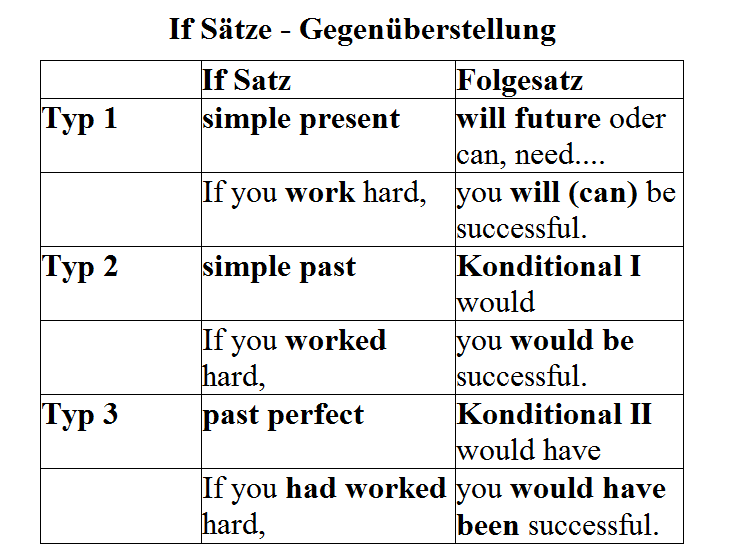If-Sätze im Englischen in der praktischen Anwendung
| if-Satz | Folgesatz | Wahrscheinlichkeit | |
|---|---|---|---|
| if-Satz Typ 1 | simple present | will-future, can, need etc. | der Bedingung aus dem if-Satz folgt zwingend eine Konsequenz |
| Beispiel: | If you work hard, | you will be successful. | |
| if-Satz Typ 2 | simple past | Konditional I would+Grundform | Bedingung noch möglich, aber nicht wahrscheinlich |
| Beispiel: | If I had money, | I would buy a BMW. | |
| if-Satz Typ 3 | past perfect | Konditional II would have+ infinitive perfect | Bedingung nicht mehr erfüllbar |
| Beispiel: | If I had had money, | I would have bought a BMW. |
If-Satz Typ I
Im If-Satz Typ I folgt aus der Vorgabe des if-Satzes zwingend eine Konsequenz im Folgesatz.
Wenn A, dann B. Im if-Satz steht simple present, im Folgesatz will-future oder ein modales Hilfsverb (can, need etc.) + Infinitiv.
Beispiel: If you eat less, you will lose weight.
If Satz Typ II
Die Bedingung des if-Satzes ist zwar unwahrscheinlich aber noch erfüllbar. Im if-Satz steht simple past, im Folgesatz Konditional I (would + Grundform).
Beispiel: If you worked hard, you would be more succesful.
If-Satz Typ III
Die Bedingung des if-Satzes ist nicht mehr erfüllbar. Der if-Satz steht im past perfect, der Folgesatz im Konditional II (would have – present perfect infitive).
Beispiel: If you had worked harder, you would have been more successful.
0 Konditional
Beim sogenannten 0-Konditional steht im if-Satz eine Bedingung im simple present, die einen Befehl im Imperativ im Konsekutivsatz zur Folge hat.
Beispiel: If you don’t like it, go

